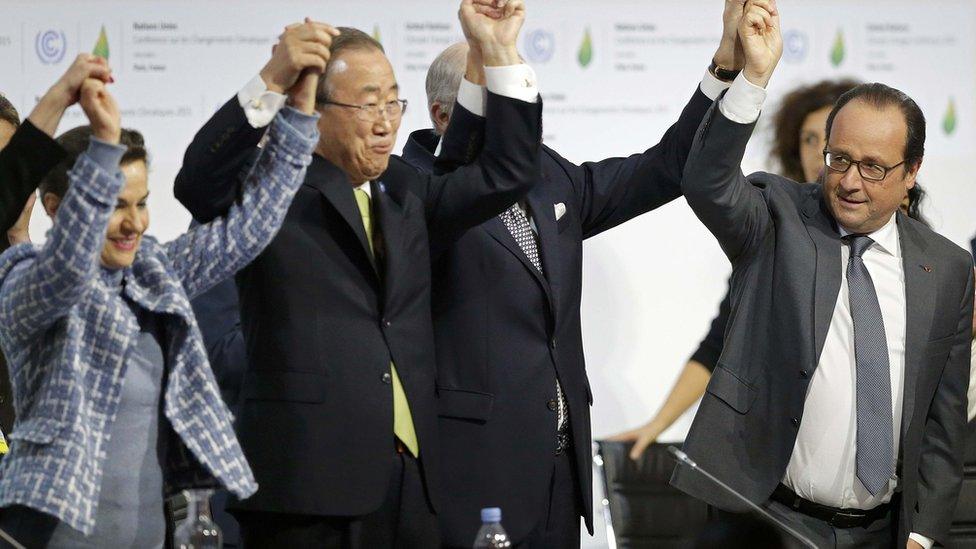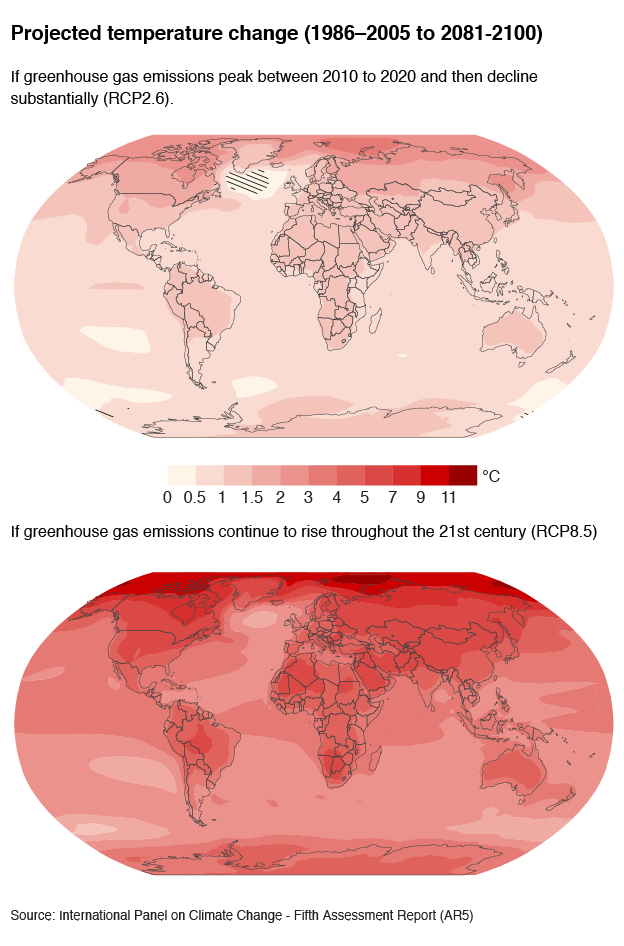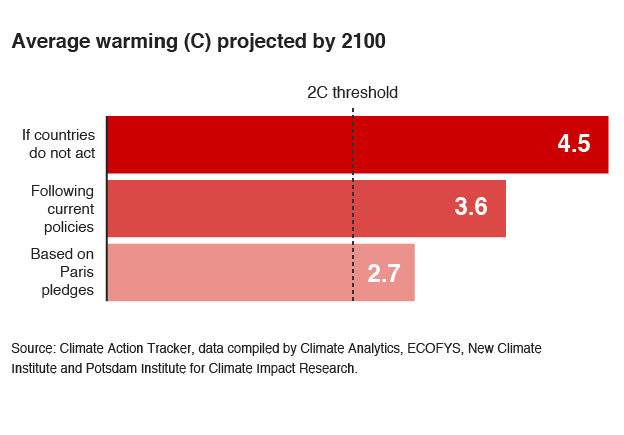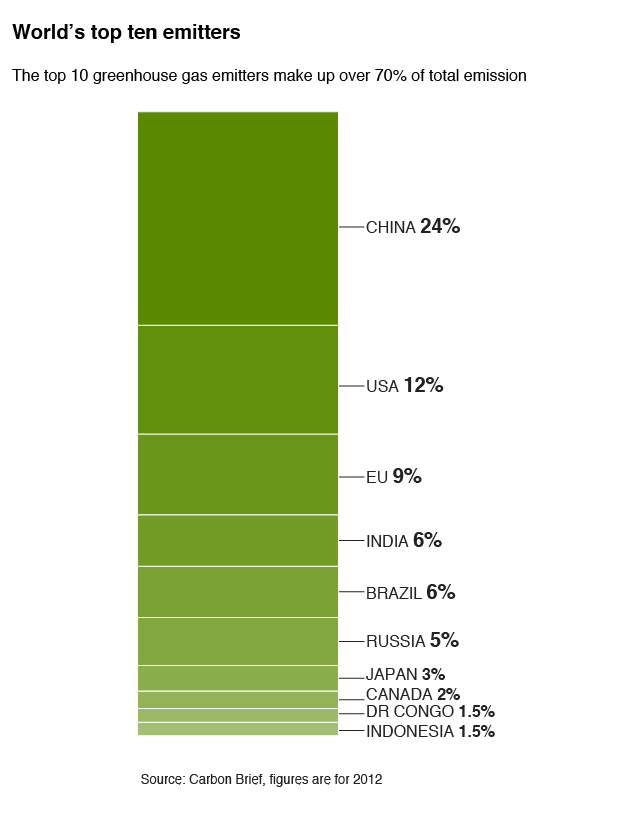COP21: What does the Paris climate agreement mean for me?
- Published
As the euphoria of delegates at the UN climate talks in Paris fades, it is time to get down to the business of saving the planet and ask what does it mean for me?

UN Secretary-General Ban Ki-moon and French President Hollande join in the celebrations
What did I miss?
Over the past two weeks, almost every nation on the planet has sent a team of negotiators to Paris to pore over page after page of nuanced jargon peppered with what seemed like a world record attempt for the most square brackets in a document.
But these brackets did matter. In the tense talks at a conference centre in north Paris, semantics was king.
Negotiators inhabited a world were "shall" would result in something becoming legally binding and "should" actually meant voluntary, as BBC environment analyst Roger Harrabin explained here.
The fortnight kicked off with more than 150 world leaders, including Presidents Obama, Putin and Xi, descending on Paris to tell delegates that climate change was the most important issue facing us in the 21st Century.
Whether that was welcome support or unnecessary pressures it meant negotiators got down to business, often working through the night.
On Saturday evening - to claps, cheers and tears - a new landmark deal was born.
It was agreed by 195 nations. They will attempt to cut greenhouse gas emissions to a level that will limit the global average temperature to a rise "well below" 2C (3.6F) compared to pre-industrial levels - a level of warming deemed to be the point when dangerous climate change could threaten life on Earth.


What does it mean for me?
It depends on a multitude of factors - who you are, where you live, how you get from A to B, how you earn a living, how you spend your cash and how you like to spend your spare time.
If you live on a small low-lying island in the middle of the Pacific Ocean, the new agreement offers hope.
If nations manage to deliver then it could be the difference between having to flee your ancestral home and starting again thousands of miles away in an unfamiliar foreign land, or being able to plan and build for your family's future.
If you live in an industrialised, developed nation then it all depends on how committed governments and leading businesses are to achieving the goal. It could affect how much tax you pay, it could affect how much it will cost you to run a car - it may affect how much it costs you to feed and clothe you and your family.
But if nations do not commit to achieving the goal of limiting temperature rise to well below 2C, then the cost of adapting to the impact of a changing climate system will also affect the cost of living.
Numerous studies, including the Stern Review on the Economics of Climate Change, external, say the cost of inaction will cost us all a great deal more than shifting to a decarbonised, climate-friendly way of life.

If it's not legally binding, how will it work?
Some of it is legally binding within the United Nations framework. The regular review and submission of emission reduction targets will be binding.
So too will the $100bn fund from developed economies to help emerging and developing nations decarbonise their energy mix - which means moving away from burning fossil fuels to clean energy sources, such as renewables and nuclear.
What won't be legally binding will be the emission targets. These will be determined by nations themselves.
Within the agreement the targets are known as Intended National Determined Contributions (INDCs). To date, 187 countries have submitted their INDCs.
Observers have calculated that all of the targets, if delivered, will only curb warming by 2.7C. This is well above, not well below, the 2.0C goal of the Paris Agreement.
This begs the question why the targets themselves are not legally binding under international law.
This relates back to the 2009 climate summit in Copenhagen. Observers say the attempt to impose binding targets on countries then was one of the reasons why the talks failed.
In Paris, a number of big emitting emerging economies - including China, India and South Africa - were unwilling to sign up to a condition that they felt could hamper their economic growth and development.



Who sealed the deal?
Nations have not been shy in coming forward to highlight their role in delivering a deal in Paris.
For example, just a few hours after the global climate deal was struck, US President Barack Obama told millions of TV viewers that it provided the "best chance we have to save the one planet we have". He also did not miss the opportunity to highlight the importance of "American leadership" in clinching the deal.
UK Prime Minister David Cameron said the deal represented "a huge step forward in securing the future of the planet".
The reaction from world leaders echoed the rousing rhetoric of their speeches on the opening day of the two weeks of negotiations.
The fact is that every nation played their part. Under the UN system, a single nation could have objected and refused to adopt the agreement and the deal would have been lost.
The announcement was greeted by cheers and excitement in the hall
Among the more colourful rumours circulating in Paris was a suggestion that there was papal pressure to one president who was wavering.
And one shining star of the negotiations was French Foreign Minister Laurent Fabius, the president of the conference.
People lauded his handling of nations' positioning and posturing, with many saying that his political and diplomatic experience was one of the main reasons why there was a happy ending to the story.
Now the question is not who sealed the deal but who will deliver?

Reality bites...
Even the most supportive observers accept that it is going to be a very tall order for the world to deliver a package of measures that will result in limiting global temperature rise to "well below" 2C (3.6F), let alone 1.5C, above pre-industrial levels.
Finance departments of governments around the globe are going to have to put decarbonisation at the heart of their fiscal policies. Past evidence suggests that this will be a big ask. To date, it has - at best - been on the margins and as soon as there have been wobbles in economic activity, green policies have either been put on the back burner, diluted, ignored or removed from statute books altogether.
There will have to be a paradigm shift in the philosophy of political parties. Lip service and nods, accompanied with a little tinkering will not be enough to deliver the aims of the Paris Agreement.
Campaigners say this is where you come in. Fiscal policy shapes economic activities. Governments, made up from elected politicians, shape fiscal policy. You elect politicians.

UN climate conference 30 Nov - 11 Dec 2015

COP 21 - the 21st session of the Conference of the Parties - saw more than 190 nations gather in Paris to agree new global pact on climate change, aimed at reducing greenhouse gas emissions to avoid the threat of dangerous warming as a result of human activities.
Explained: What is climate change?
In video: Why does the Paris conference matter?
Analysis: Latest from BBC environment correspondent Matt McGrath
In graphics: Climate change in six charts
More: BBC News special report (or follow the COP21 tag in the BBC News app)
